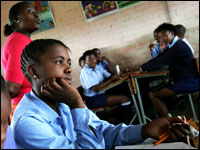...the story, smf observes, sounds eerily familiar
by Charlayne Hunter-Gault | Morning Edition | National Public Radio - The third report in a six-part series.
Listen Now [5 min 47 sec] add to playlist
Reporter's Notebook: The heirs to Nelson Mandela's legacy battle among themselves, as the hope he inspired fades under the weight of unmet needs for the black masses. Charlayne Hunter-Gault reflects on two decades of reporting from South Africa.
Alice Kreit/NPR
Morning Edition, June 12, 2008 · Public education is critical to the success of South Africa's young democracy. The country's school system, however, seems to be getting a failing grade.
A visit to a rural primary school in Orkney, a gold-mining town southwest of Johannesburg, says much about why the system is in trouble.
On a recent day, some 1,600 students were enjoying a rich stew of beans and rice. But because of budgetary constraints, Reahola Primary School is able to feed its students only four days a week, says Principal Nachemane Majola.
"The fifth day they stay without food, and that makes them also not want to come to school, because what drives them to come to school is when they eat," he says, "because there is nothing at home."
Little Improvement Seen
Most of the families in the area are black and poor. The government is trying to make improvements at the school, according to Majola, but the budget allocations are still too small. There is not enough money to renovate the 25-year-old building and its collapsing ceilings. Many of the school's students are HIV-positive orphans who are suffering from illness and hunger. The lack of funding hobbles the ability to meet these students' needs.
Reahola Primary School needs more books and basic supplies, but many of the country's other schools opened this past year with no books at all. The lack of adequate materials has led to steadily decreasing student performance.
Mary Metcalf, head of the School of Education at Johannesburg's University of the Witwatersrand, says only 17 percent of high school graduates achieve grades good enough to enter college.
Metcalf says these statistics are rooted in the country's history, when the white minority government deliberately undereducated blacks to keep them subservient.
One of the first tasks of the new black-led government after it came to power in 1994 was to create a unified system that it hoped would be more equitable. Nevertheless, inequities remain, according to experts such as Metcalf.
"It's the children of the poor who we continue to fail," she says.
Metcalf is among those who are worried about consequences of such a severely challenged education system.
"If you look at the number of young people who left school between 2005 and 2007, there's half a million who left with no school-leaving certificate, and who have very little chance of doing anything other than competing for very lowly skilled employment opportunities," she said.
Better Future Promised
South Africa's education minister, Naledi Pandor, has acknowledged the poor state of the public education system, and she has stressed the need for the government and its partners to find new ways of fixing it. The new leadership of the ruling African National Congress party says that after next year's presidential elections, it will work to increase the number of qualified teachers by reopening teacher training institutions, especially in poor rural areas.
"The preoccupation after 2009 will be training, training, training," said ANC spokesperson Jesse Duarte.
Meanwhile, despite myriad challenges at Reahola Primary School, Majola says he is hopeful.
"I've gone through apartheid. I attended very poor schools in farms, and I know with the little knowledge that I've acquired with the help of my parents, that keeps me going," Majola says. "We are still a new democratic country that will develop in time. ... I think if we are focused, we'll get there."





No comments:
Post a Comment